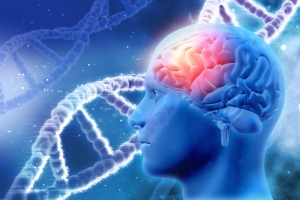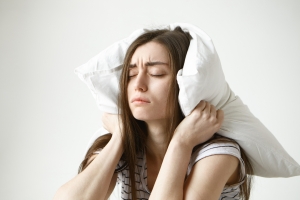Sleep has taken a backseat in the frenetic lifestyle that we all are leading, especially urbanites residing in the metros. Long commutes to and from work, juggling household responsibilities with work, binge watching shows/movies to unwind, etc., pushes sleep to the end of our priority list. On the contrary, sleep should be given equal importance as given for food.
Insufficient or inadequate sleep can disrupt our melatonin levels.
| This blog post will cover the following: What Is Melatonin? Why Is Melatonin So Important for Sleep? What Happens When You Are Sleep Deprived? What is Sleep Hygiene? What Are The Tips to Maintain Good Sleep Hygiene? What Are the Foods That Help In Improving Melatonin Levels? |
What Is Melatonin?

For those who don’t know much about melatonin, melatonin is a hormone produced by the pineal gland, a pea-shaped endocrine gland present in the centre of the brain, behind he corpus callosum (bundle of nerve fibres that connect the right and left cerebral hemispheres) in response to darkness. The pineal gland controls your body’s circadian rhythm (24- hour internal clock or biological clock) by secreting melatonin.
Why Is Melatonin So Important for Sleep?
Melatonin is called as “sleep hormone” as it regulates sleep. It is very essential for sleep and lower levels of melatonin will cause insomnia or difficulty in sleeping. This hormone is normally secreted only during the dark. Light disrupts the secretion of melatonin. Melatonin helps to maintain your body’s circadian rhythm and associates the sleep-wake cycle with night and day, facilitating a transition to and promoting consistent and quality sleep.
Remember that longer the exposure to increased melatonin levels, more will be the sleep efficiency, which is an indicator of the depth or intensity of sleep and also the total duration of sleep.
Why Does Blue Light Disrupt the Production of Melatonin?

Blue light is a portion of the visible light spectrum and is emitted by LED, fluorescent lights and electronic devices such as mobile and laptops. This light can affect sleep cycles, alertness and melatonin production. Your brain perceives blue light as day and this may interfere with melatonin’s sleep promoting effects, which is why exposure to light, mobiles and laptops causes in disturbances in the sleep-wake cycle.
What Happens When You Are Sleep Deprived?
Melatonin suppression typically leads to sleep deprivation. Sleep deprivation in turn causes your brain to become exhausted. A tired brain may not allow you to carry out your tasks properly and you will be unable to concentrate on your work or find it more difficult to grasp and learn new things. All of us would have experienced these symptoms when we are sleep deprived. Sleep deprivation also leads to physical exhaustion.

Furthermore, there may be delay in the brain sending signals to your body, which may decrease your coordination and increases the risk for accidents. Studies have shown that continuous sleep deprivation (less than seven hours in the night) in the long term will not allow much time for the brain to clear beta-amyloid, a protein whose buildup in the brain increases the risk of Alzheimer’s.
Hence, it’s very important to have sufficient sleep. Following sleep hygiene before bed time will help you to have an undisturbed and peaceful sleep.
What Is Sleep Hygiene?
Sleep hygiene refers to embracing certain healthy practices/habits, behaviour and creating conducive environmental factors to help you have a sound sleep in the night. Poor sleep hygiene can negatively impact both the quantity and quality of sleep.
According to Dr. Luis F. Buenaver, a sleep expert from Johns Hopkins, melatonin levels rise two hours before bedtime. Hence, it’s very important to make the bedroom ambience amicable for secretion of melatonin before going to sleep.
Tips On How To Practise Sleep Hygiene?
- Remember that bedtime habits alone do not suffice for getting a good sleep. Incorporating positive routines during the day too will influence your sleep. Get enough daylight exposure, especially sunlight, as it is one of the key drivers of circadian rhythm that promotes quality sleep.
- Exercise regularly, avoid smoking as nicotine stimulates the body and disrupts sleep. Reduce your alcohol consumption and it’s best to avoid alcohol consumption in the late evening as it may cause sleep disruption in the night. Also, cut down on caffeine consumption in the late evenings.
- Try to have an early dinner because a heavy tummy just before your bedtime will cause difficulty in sleeping.
- Restrict activities in the bed such as playing games, using your mobile, laptop, etc.
- Try to maintain a consistent sleep schedule such as going to sleep and waking up around the same time everyday, irrespective of whether it’s a weekday or weekend. A fixed sleep schedule helps to maintain consistent sleep.
- Do not take long naps during the day as this will cause sleep difficulty during the night.
- Create a bed-time routine or pattern that will signal your brain that it’s bed time. Follow the same steps every night. It can be as simple as a routine as brushing your teeth or wearing your night clothes just before you go to sleep. Also, just before going to sleep, do things that help you relax such as listening to soothing music, reading a book or light stretching.
- Dim your lights or switch them off as bright lights hinder melatonin secretion.
- Ensure a 30-60 minutes device-free buffer time before bed time since devices such as cell phones, tablets, laptops, etc., emit blue light that decrease melatonin secretion and therefore cause sleep disruption.
- Use of aroma candles with mild and calming scents such as lavender may induce a calmer state of mind and help in creating a very conducive ambience for a sound sleep.
- Make sure your mattress and pillows are comfortable to sleep on.
What Are The Dietary Sources of Melatonin?
In the recent times, foods containing melatonin are considered as nutraceuticals as they are believed to have potential positive health impacts in view of their antioxidant, anti-inflammatory and immunity-boosting properties.
Insomnia (difficulty in sleeping or sleeplessness) is affecting nearly one-thirds of the population worldwide. The intake of melatonin rich foods is believed to assist sleep and help in the treatment of insomnia. It was found that melatonin levels in serum increased after consumption of melatonin containing foods.
The following are the dietary sources of melatonin
1. Animal sources: Eggs and fish are found to have higher concentrations of melatonin than meat. Cow’s milk is a good source of melatonin. Melatonin was detected in breast milk too.
2. Cereals: Studies show that colored rice, like black rice, has more melatonin than white rice. Also, unpolished rice has higher melatonin than polished rice, about three times more.
Wheat, barley and oats have relatively higher melatonin content. Bread crumb has higher melatonin levels than the crust.
3. Fruits: Grapes, cherries and strawberries are found to have highest melatonin content.
4. Vegetables: Most of the vegetables contain melatonin except for beetroot and potato. However, tomatoes and peppers have higher melatonin content than other vegetables.
Certain varieties of mushrooms such as Porcino mushroom as it is commonly called in Italian is said to have significant melatonin content. This is widely distributed across Europe, Asia and North America.
5. Legumes and pulses: Soya bean and moong (whole). Germination increases the melatonin content manifold and hence to get the maximum melatonin content, it’s recommended to include germinated versions of these.
6. Nuts: Melatonin is found in various nuts such as pistachio, walnuts and peanuts. Pistachio has the highest melatonin content in nuts.
7. Foods rich in tryptophan: Foods rich in tryptophan are also believed to help in increasing melatonin levels as tryptophan is a precursor (a compound from which another compound is formed by a chemical reaction) of melatonin and serotonin, mood regulating hormone. Tryptophan is a kind of amino acid.
The following foods contain significant quantities of tryptophan (Source:Nutritive Value of Indian Foods, National Institute of Nutrition, Hyderabad)
All values are per 100gm of food
- Bajra – 110 mg; Barley – 100 mg
- Soy beans – 80 mg
- Drumstick leaves – 100 mg; Spinach – 100 mg
- Colocasia – 110 mg; Potato – 100 mg; Sweet potato – 110 mg; Cauliflower – 90 mg; French beans – 90 mg;
- Cashew Nut – 110 mg; Sunflower seeds – 90 mg; Sesame seeds- 80 mg
- Ripe mango and papaya – 130 mg; Persimmon (Amarphal)– 110 mg
- Egg, hen and pork – 90 mg
- Milk, buffalo and cow’s milk – 90 mg; Cheese – 80 mg
Use Of Melatonin Supplements for Jet Lag
You must have seen your relatives/friends coming from foreign countries taking pills to overcome jet lag. These are nothing but melatonin pills.
Nowadays, melatonin supplements are prescribed for jet lag. Jet lag can occur when you travel across varied time zones such as on inter-continental flights. This happens as the source and destination time zones vary and there is a misalignment with the local day-night cycle, due to which your body clock gets confused. Evidence suggests that melatonin supplements help to reset the sleep-wake cycle and improve sleep in people with jet lag. But, these should be taken strictly under the prescription of a healthcare professional.
This brings us to the end of this blog post. Hope you found this article informative!! 🙂
Also Read:
References
https://www.hopkinsmedicine.org/health/wellness-and-prevention/melatonin-for-sleep-does-it-work
https://www.sleepfoundation.org/melatonin
https://www.ncbi.nlm.nih.gov/pmc/articles/PMC2654999/
https://www.ncbi.nlm.nih.gov/pmc/articles/PMC5412446/
https://www.nccih.nih.gov/health/melatonin-what-you-need-to-know
https://www.ncbi.nlm.nih.gov/pmc/articles/PMC5409706


Such an informative article which is very much required for present generation including elders and children as well.
Well explained as always.
Keep blogging 🙂
LikeLike
Thank you Pavithra. I am glad that you found this article informative.
LikeLike